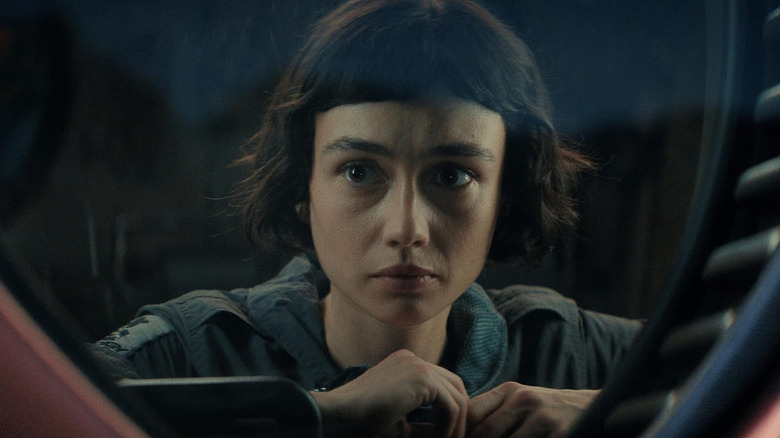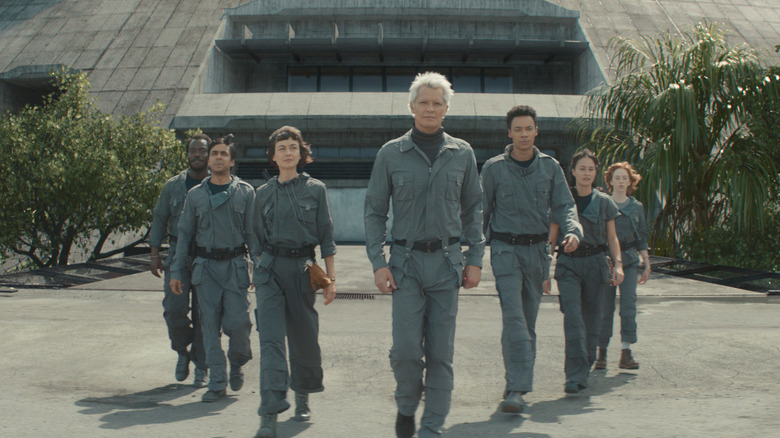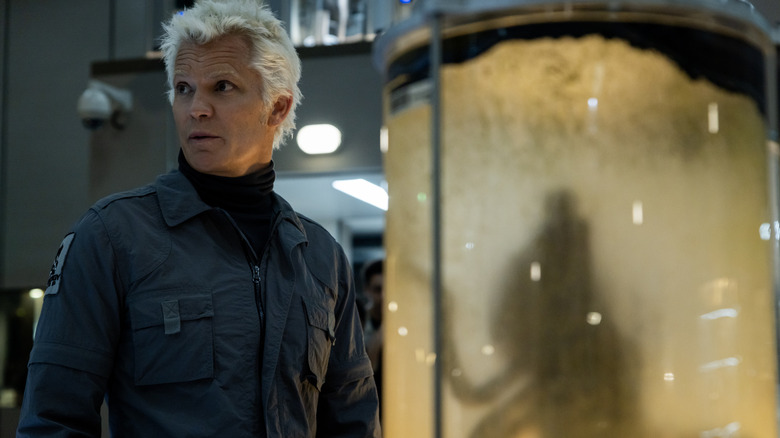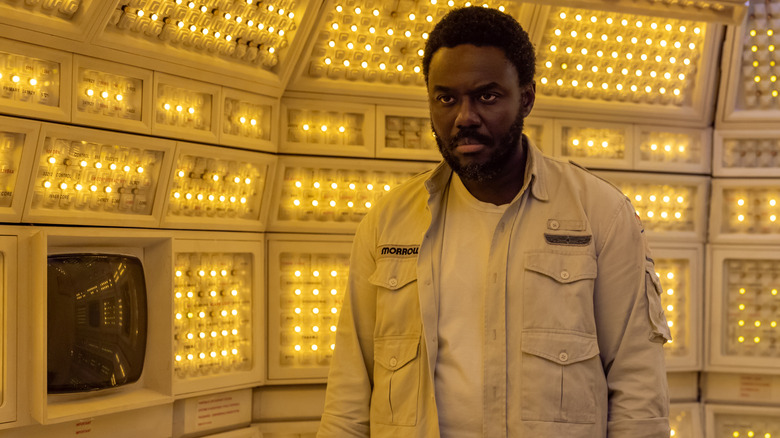Alien: Earth: Everything You Need To Remember To Watch The New Show
On Hulu, nobody can hear you stream. To anyone still reading this article after an opening like that: Congrats on passing the test to prove just how big of an "Alien" fan you really are. The space-set horror franchise has exclusively resided on the big screen ever since Ridley Scott debuted his original film back in 1979, but all that is set to change with the arrival of "Alien: Earth." Not only is the property switching mediums for the first time ever here, but it's also adding a fresh new creative voice to the fray, with Noah Hawley taking the reins on what promises to be one of the wildest additions to the "Alien" canon yet.
The release of this show, however, raises a pressing question for all the "Alien" viewers out there. The original quartet of movies exclusively followed the trajectory of Sigourney Weaver's Ellen Ripley (or her clone), who was arguably the unluckiest cinematic hero of all time as she came face-to-facehugger with those deadly Xenomorphs again and again and again. However, Scott's prequel films "Prometheus" and "Alien: Covenant" took a much different tact, focusing instead on the villainous android David (Michael Fassbender) and his increasingly twisted efforts to create the perfect organism as we know it. The most recent movie, "Alien: Romulus," finally broke away from tradition and focused on a new group of characters. So, where on this wide-ranging spectrum does "Alien: Earth" fall, and how much foreknowledge is required to fully enjoy this new series?
As it turns out, not much at all. The Hulu/FX show may take place in a universe with decades of lore, an intimidating legacy to live up to multiple bona fide classics, and even a pair of "Predator" crossovers that muddy the waters even more ... and may yet be the best path forward once again. Fortunately, "Alien: Earth" only requires the most basic familiarity with the material, and we're breaking it all down for you below.
We've seen Earth in the Alien franchise before ... but never like in Alien: Earth
Ideally, every installment in the "Alien" franchise will bring something new to the plate. James Cameron switched genres completely with "Aliens," David Fincher brought his uniquely cynical sensibilities to "Alien 3," and even Ridley Scott upended everyone's expectations by turning both "Prometheus" and "Alien: Covenant" into a prequel duology about the synthetic god behind the biological machine. Now, Noah Hawley is changing things up all over again, this time by bringing the action in "Alien: Earth" to (you guessed it) Earth.
But wait! Is that really something we've never seen before? The mainline films actually ended right on the cusp of this very situation, as the very last moments of "Alien: Resurrection" showed its heroes arriving on our dilapidated planet. Both "Prometheus" and "Covenant" similarly include brief scenes taking place on Earth, and, of course, we'd be remiss not to mention the (semi-canonical) "Alien vs Predator" movies, each of which are confined to humanity's home world. What sets "Alien: Earth" apart from all the rest, however, comes from the potent idea of actually bringing the Xenomorphs (and various other interstellar travelers) to our very doorstep. No longer can we consider these unknowable forces of nature abstract threats somewhere deep in the cosmos — now, they're up close and uncomfortably personal. That appears to have been the main driving force behind turning this pitch into a full-length series. And much of the appeal comes from seeing how the show's characters will contain the threat (or fail to) and how this may set up the circumstances behind Scott's original film.
Xenomorphs and Facehuggers and eggs, oh my!
At the risk of stating the obvious: Yes, viewers of "Alien: Earth" should probably know that some background on the Xenomorphs would be helpful. The biomechanical creatures ripped right out our worst Lovecraftian nightmares have always been the central antagonist of the entire "Alien" property (well, besides capitalism, at least), and that certainly doesn't change here. The premise of this prequel series involves a deep-space research vessel — one containing all sorts of extraterrestrial horrors that humanity was never meant to cross paths with — finding itself on a collision course with Earth. It's hardly a spoiler to reveal the vessel ends up colliding with our home planet, though the way this ultimately unfolds will likely defy expectations.
At the heart of all this chaos is the dastardly Xenomorph and its parasitic lifecycle. Although this is generally explained in the early episodes of "Alien: Earth," for the benefit of those who may not have watched the movies, the show operates under the assumption that audiences already have a broad understanding of what goes down. The fully-grown Xenomorphs pose the biggest threat, of course, but that's hardly the extent of their danger. The recognizable cylindrical egg (known officially as an Ovomorph) might be one of the most infamous instances of production design ever. That pales in comparison to what resides within: the creepy, arachnid-like Facehugger that launches itself at victims and invasively penetrates them in order to plant the monstrous Chestburster (which, yes, does exactly what you think it does). In turn, this adolescent stage eventually gives way to the Xenomorphs and the pinnacle of (lightly bioengineered) evolution as we know it.
Unfortunately, all the background info in the universe won't help the poor souls just waiting to be turned into gestating hosts throughout "Alien: Earth."
The Company is back ... along with several Weyland-Yutani rivals
At the point in the timeline when "Alien: Earth" opens, some of the world-building details we're familiar with have not yet come to pass. For instance, Scott's "Alien" introduces the faceless conglomerate known as Weyland-Yutani, a corporation that basically governs all of humanity and its colonizing efforts throughout interstellar space. This deeply cynical and dystopian view of the future is integral to the franchise's themes, where capitalistic enterprises dehumanize and oftentimes even dispose of the actual blue-collar workers who get things done. Yeah, you could say that Scott and writer Dan O'Bannon were completely ahead of the curve when it comes to the many, many issues posed by the rise of AI these days. Yet, the version of the dreaded, so-called Company we see in "Alien: Earth" is markedly different.
When the show's premiere episode begins, set in the year 2120 (only two years before Scott's original film), some opening text establishes that Earth is ruled by multiple business entities vying for supremacy. Operating like sovereign nations all on their own, each one has carved out its own territory and borders across the globe. The crashing spaceship that kicks everything off belongs to Weyland-Yutani, of course, but it also has the misfortune of landing in a city controlled by a rival company named Prodigy. We know from the various "Alien" movies that Weyland-Yutani will ultimately emerge victorious, so could this season (or future seasons) of "Alien: Earth" begin to lay the groundwork for this takeover to happen? In any case, part of the draw for hardcore fans will be the idea of finding out more details about the Company responsible for (checks notes) basically every bad thing that happens throughout the entire "Alien" franchise.
Alien: Earth introduces Cyborgs and Hybrids in addition to Synthetics
It wouldn't be an "Alien" production without some inhuman characters thrown into the mix somewhere. As much as the franchise is associated with genres like horror and action, it's still a science-fiction story at its heart. And that means embracing wild concepts like elephant-like extraterrestrial fossils at the controls of a giant gun, ancient aliens seeding the Earth with life, and Synthetic beings leaking milky-looking fluid and generally being up to no good. That last part plays a huge role in "Alien: Earth," following the lead of previous characters like Ian Holm's Ash, Lance Henriksen's Bishop, and even Michael Fassbender's David ... but with a fascinating twist.
Creator Noah Hawley sticks with the well-established pattern of featuring Synthetic characters taking orders from their corporate overlords, as best exemplified by Timothy Olyphant's white-haired Kirsh, but he also adds a couple of fascinating wrinkles for us to contend with. Take the main lead of the show, Sydney Chandler's Wendy. In actuality a terminally-ill child whose consciousness has been transferred into the body of a Synthetic, her unusual status as a "Hybrid" adds a whole new layer to "Alien" lore. Or consider Babou Ceesay as a Cyborg named Morrow, who is a human with robotic enhancements. These three "classes" of beings remain utterly faithful to everything we remember from the previous movies, but it's safe to say that Hawley has a lot on his mind when it comes to what truly makes us human.
"Alien: Earth" premieres August 12, 2025, on FX and FX on Hulu.




